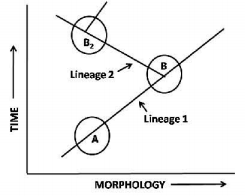 Multiple Choice Questions
Multiple Choice QuestionsGiven below is a graphical representation of changes in morphological features over a period of geological time scale, where population A accumulates heritable morphological changes and give rise to a distinct species B. Population B splits into a distinct species B.

Which of the above lineages represent the pattern of speciation by cladogenesis?
Lineage 1
Both the lineages 1 and 2
Lineage 2
Neither of the lineages 1 and 2
Red hair is a recessive trait in humans. In a randomly mating population in Hardy -Weinberg equilibrium, approximately 9% of individuals are red-haired. What is the frequency of heterozygotes?
81%
49%
42%
18%
As per the cladistic taxonomy, Archosaurs are a group of diapsid amniotes which include extinct dinosaurs. The living representatives of the group consist of
Anurans and Aves
Aves and Crocodilia
Aves and Agnatha
Osteichthyes and Squamata
The correct order of periods from Palaeozoic to Mesozoic era is
Triassic → Jurassic → Cretaceous → Cambrian → Ordovician → Silurian → Devonian → Carboniferous → Permian
Palaeocene → Eocene → Oligocene → Miocene → Pilocene → Pleistocene → Holocene
Cambrian → Ordovician → Silurian → Devonian → Carboniferous → Permian → Triassic → Jurassic → Cretaceous
Pliocene → Eocene → Oligocene → Silurian → Devonian → Carboniferous → Triassic → Jurassic → Cretaceous
C.
Cambrian → Ordovician → Silurian → Devonian → Carboniferous → Permian → Triassic → Jurassic → Cretaceous
The correct order of periods from the Palaeozoic to Mesozoic era is
Cambrian → Ordovician → Silurian → Devonian → Carboniferous → Permian → Triassic → Jurassic → Cretaceous
Flufftails in mainland Asia show high variation in tail color. However, in the far-out Pacific island, the flufftails show very little variation in tail colour. This variation in tail colour can be explained by all of the following except
founder effect
homologous evolution
genetic drift
frequency-dependent selection
To understand the singing behaviour in song-birds, the following three characters were measured as shown in the graph:
A. Territoriality rate
B. Female fertility rate
C. Song rate

Which one of the following conclusions is most appropriate?
Male birds sing as a display of strength to rivals and to attract females.
Male birds sing to display parental care behaviour.
Male birds sing only to display that females are sexually receptive.
Male birds sing only to deter other male rivals from competing for territories.
Following diagrams represent various ways in which a character may evolve:

Which of the following is the correct definition for the character evolution patterns shown above?
A - Autapomorphy; B - Synapomorphy; C - Homoplasy
A - Autapomorphy; B - Homoplasy; C - Synapomorphy
A - Synapomorphy; B - Autapomorphy; C - Homoplasy
A - Synapomorphy; B - Homoplasy; C - Autapomorphy
Column A lists the names of evolutionary biologists and column B lists the description of evolutionary mechanisms proposed by them in random order.
| Column A | Column B |
| A. Jean-Baptiste Lamarck | (i) Variation at the molecular level is selectively neutral |
| B. Charles Darwin | (ii) Inheritance of acquired characters |
| C. Motoo Kimura | (iii) Differential reproduction of genotypes |
| D. Seawall Wright | (iv) Changes in allele frequency due to random genetic drift. |
A - (i); B - (ii); C - (iv); D - (iii)
A - (ii); B - (iii); C - (i); D - (iv)
A - (iii); B - (i); C - (ii); D - (iv)
A - (ii); B - (iii); C - (iv); D - (i)
The Western honey bee (Apis mellifera) collects nectar and pollen from flowers. The following are few hypotheses proposed to explain this behaviour in A. mellifera:
A. In the past, those individuals that fed on nectar and pollen left more descendants than those who preferred only nectar or only pollen.
B. The sensory stimulus from taste receptors in the honey bees lead to a positive reinforcement to look for more of the same food.
C. The honey bee's nervous system is pre-disposed to like the sweet taste.
D. The ancestor of honey bee was dependant on some sugar and protein rich diet and the honey bees have inherited the same taste perception.
Which of the following combination of ultimate hypotheses best explains the bee's feeding behaviour?
A and B
B and C
A and D
B and D
A plant is visited by bats during the night and sunbirds during the day. Given this information, which of the following characters best match this plant?
The plant is a herb with saucer-shaped white flowers.
The plant is a shrub with tubular, red, diurnal flowers.
The plant is a liana with tubular cream coloured flowers.
The plant is a grass with white coloured fragrant, spikelets.
